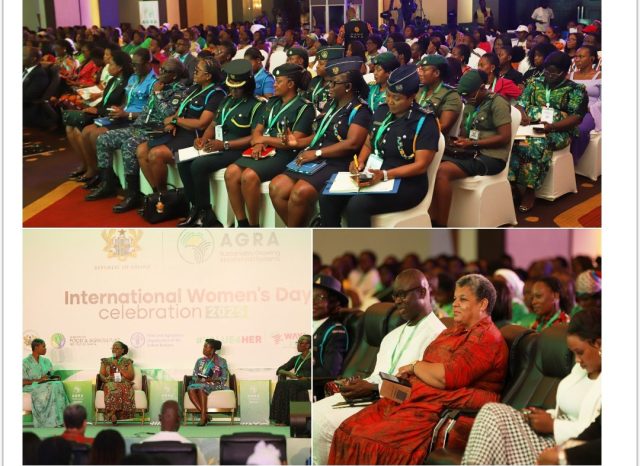The International Women’s Day (IWD) 2025 celebration, organized by the Alliance for a Green Revolution in Africa (AGRA), the Food and Agriculture Organization (FAO), and the Ministry of Gender, Children, and Social Protection, has
brought together key stakeholders to highlight the transformative role of women in driving intra-African trade and economic development.
The event, supported by the Ministry of Trade, Agribusiness and Industry, and the Ministry for Food and Agriculture, aims to raise awareness about the critical role of women in trade within Africa’s agrifood sector.
Key objectives of the celebration include fostering engagement with stakeholders, showcasing successful models for integrating women-led businesses into regional and global value chains, and mobilizing commitments to address barriers to women’s participation in trade.
The event also promotes the African Continental Free Trade Area (AfCFTA) Protocol on Women and Youth in Trade, encouraging swift adoption and implementation. Additionally, it highlights the
FAO’s Women and Trade Models and the Value4Her platform as innovative tools for capacity building and making connections.
Regional alignment with the Economic Community of West African States (ECOWAS) and other trade frameworks is also a key focus of the celebration.
Dr. Godfrey Jasaw, Chair of the Parliamentary-Select Committee on Food, Agriculture, and Cocoa Affairs, delivered a keynote address on the occasion of 2025 International Women’s Day, emphasizing the need for resilient and inclusive food systems.
According to Dr. Jasaw, climate change is a critical issue that requires immediate attention, and building resilient food systems is essential to address this challenge. He noted that 63% of actors in agriculture are women, highlighting the importance of supporting women entrepreneurs in the food transformation enterprise.
Dr. Jasaw acknowledged the immense contribution of women in agriculture and entrepreneurship, particularly those working with organizations like Agra MBA. He assured the audience that the parliament is committed to working with women to address the challenges they face, including entrepreneurship, capital, and structural hindrances.
The keynote address also highlighted the importance of legislative arrangements to address operational inequalities faced by women. Dr. Jasaw emphasized that the parliament is ready to be the champions and voices of women, supporting them in their endeavors.
The address concluded by reiterating the need for collective action to address the challenges faced by women in agriculture and entrepreneurship, emphasizing that “we
are lucky that the new governments comprehend the last 30 days, and we appear to be recycling the kind of results and outputs that we are all witnessing.”
Abebe HaileGabriel, Assistant Director General (ADG) and Regional Representative (RR) of the Food and Agriculture Organization (FAO), delivered special remarks, emphasizing the crucial role women play in Africa’s commerce, particularly in informal markets, agribusiness, manufacturing, and cross-border trade.
Despite constituting nearly two-thirds of the agrifood workforce, women face significant systemic barriers, including limited access to finance, restrictive policies, and trade-related gender biases. To overcome these obstacles, Gabriel suggested five key steps:
– Targeted Financial Products: Provide financial products, capacity-building, and mentorship programs tailored to women-led
businesses.
– Strengthen Trade Policies: Strengthen trade policies that facilitate women’s participation in national, regional, and international trade.
– Leverage Technology: Leverage technology to provide women with better access to e-commerce platforms, digital payments, and trade information.
– Advocate for Gender-Sensitive Policies*: Advocate for gender-sensitive trade policies that eliminate discrimination and promote economic inclusivity.
– Collaborative Efforts: Governments, private sector actors, development partners, and civil society must work together to create enabling environments for women in trade.
The FAO has launched initiatives to support women’s empowerment in agrifood systems, including the Commit to Growth Equality (CGE) initiative, which aims to increase financing, partnerships, and targeted investments for gender equality and women
empowerment.
As the world prepares for the International Year of the Woman Farmer in 2026, Gabriel emphasized the need for collective action to promote gender equality and empower women and girls in agrifood systems.
By empowering women in trade, the event organizers aim to drive economic development and promote a more inclusive and equitable society.
By Kingsley Asiedu
Send your news stories to newsghana101@gmail.com
Follow News Ghana on Google News







![Stonebwoy holds star-studded party for ‘5th Dimension’ mega album [Video]](https://ghananewss.com/storage/2023/04/stonebwoy-partyy-100x75.jpeg)






